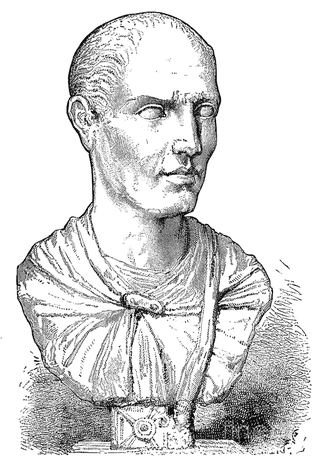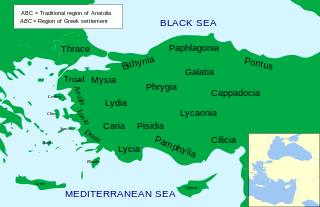This article concerns the period 69 BC – 60 BC.
80s BC is the time period from 89 BC – 80 BC.
The gens Gabinia was a plebeian family at ancient Rome. Members of this gens first appear in the second century BC. The nomen derives from the city of Gabii, east of Rome.

Lucius Licinius Lucullus was a Roman general and statesman, closely connected with Lucius Cornelius Sulla. In culmination of over 20 years of almost continuous military and government service, he conquered the eastern kingdoms in the course of the Third Mithridatic War, exhibiting extraordinary generalship in diverse situations, most famously during the Siege of Cyzicus in 73–72 BC, and at the Battle of Tigranocerta in Armenian Arzanene in 69 BC. His command style received unusually favourable attention from ancient military experts, and his campaigns appear to have been studied as examples of skillful generalship.

Pharnaces II of Pontus was the king of the Bosporan Kingdom and Kingdom of Pontus until his death. He was a monarch of Persian and Greek ancestry. He was the youngest child born to King Mithridates VI of Pontus from his first wife, his sister Queen Laodice. He was born and raised in the Kingdom of Pontus and was the namesake of his late double great grandfather Pharnaces I of Pontus. After his father was defeated by the Romans in the Third Mithridatic War and died in 63 BC, the Romans annexed the western part of Pontus, merged it with the former Kingdom of Bithynia and formed the Roman province of Bithynia and Pontus. The eastern part of Pontus remained under the rule of Pharnaces as a client kingdom until his death.

The Second Mithridatic War was one of three wars fought between Pontus and the Roman Republic. This war was fought between King Mithridates VI of Pontus and the Roman general Lucius Licinius Murena.

The Mithridatic Wars were three conflicts fought by Rome against the Kingdom of Pontus and its allies between 88 BC and 63 BC. They are named after Mithridates VI, the King of Pontus during the course of the wars who initiated the hostilities after annexing the Roman province of Asia into its Pontic Empire and committing massacres against the Roman inhabitants there. Mithridates was able to organise revolts against advancing Roman troops and play off the political factions of the optimates and populares against one another in the Roman civil wars. Nevertheless, the first war ended with a Roman victory, confirmed by the Treaty of Dardanos signed by Sulla and Mithridates. Greece was restored to Roman rule and Pontus was expected to restore the status quo ante bellum in Asia Minor.

The First Mithridatic War was a war challenging the Roman Republic's expanding empire and rule over the Greek world. In this conflict, the Kingdom of Pontus and many Greek cities rebelling against Roman rule were led by Mithridates VI of Pontus against Rome and the allied Kingdom of Bithynia. The war lasted five years and ended in a Roman victory, which forced Mithridates to abandon all of his conquests and return to Pontus. The conflict with Mithridates VI later resumed in two further Mithridatic Wars.

The Third Mithridatic War, the last and longest of the three Mithridatic Wars, was fought between Mithridates VI of Pontus and the Roman Republic. Both sides were joined by a great number of allies dragging the entire east of the Mediterranean and large parts of Asia into the war. The conflict ended in defeat for Mithridates; it ended the Pontic Kingdom and the Seleucid Empire, and also resulted in the Kingdom of Armenia becoming an allied client state of Rome.
Gordius, a Cappadocian by birth, was the instrument of Mithridates Eupator, king of Pontus, in his attempts to annex Cappadocia to Pontus. Gordius was employed by him, in 116 BC, to murder Ariarathes VI, king of Cappadocia. Gordius was afterwards tutor of a son of Mithridates, whom, after the murder of Ariarathes VII he made king of Cappadocia as Ariarathes IX. Gordius was sent as the envoy of Mithridates to Rome, and afterwards employed by him to engage Tigranes, king of Armenia, to attack Cappadocia, and expel Ariobarzanes I, whom the Romans made king of that country in 93 BC. Sulla restored Ariobarzanes in the following year, and drove Gordius out of Cappadocia. Gordius opposed Lucius Licinius Murena in the Battle of Halys, 82 BC.
The Battle of Lemnos was fought on the island of Lemnos in 73 BC between a Roman fleet and a Mithridatic fleet; it was a decisive event during the Third Mithridatic War. The primary chroniclers of the battle are Appian, Cicero and Memnon, but there remain debates about the specifics in these different accounts.
The Treaty of Dardanos was a treaty between Rome and Pontus signed between Lucius Cornelius Sulla of Rome and King Mithridates VI of Pontus. It ended the First Mithridatic War.

Pontus was a Hellenistic kingdom centered in the historical region of Pontus in modern-day Turkey, and ruled by the Mithridatic dynasty of Persian origin, which possibly may have been directly related to Darius the Great of the Achaemenid dynasty. The kingdom was proclaimed by Mithridates I in 281 BC and lasted until its conquest by the Roman Republic in 63 BC. The Kingdom of Pontus reached its largest extent under Mithridates VI the Great, who conquered Colchis, Cappadocia, Bithynia, the Greek colonies of the Tauric Chersonesos, and for a brief time the Roman province of Asia. After a long struggle with Rome in the Mithridatic Wars, Pontus was defeated. The western part of it was incorporated into the Roman Republic as the province Bithynia et Pontus; the eastern half survived as a client kingdom until 62 AD.

Cappadocia was a province of the Roman Empire in Anatolia, with its capital at Caesarea. It was established in 17 AD by the Emperor Tiberius, following the death of Cappadocia's last king, Archelaus.
Lucius Licinius Murena was a Roman politician and soldier. He was an officer (legate) in the Third Mithridatic War, a governor (propraetor) of Gallia Transalpina from 64 to 63 BC and a consul in 62 BC. He stood trial because of charges of electoral bribery. Cicero, who defended him, immortalized him in one of his published speeches.
Marcus Marius was a quaestor of the Roman Republic in 76 BC and proquaestor under Quintus Sertorius's government in exile in Spain. Marius was sent by Sertorius to Mithradates of Pontus as an advisor and military commander in the Third Mithridatic War. He is named as or more likely confused with a Varius in Appian.
Socrates Chrestus was the second son of Nicomedes III of Bithynia. He usurped the Bithynian throne by deposing his elder brother or half brother, Nicomedes IV of Bithynia.

Classical Anatolia is Anatolia during Classical Antiquity. Early in that period, Anatolia was divided into several Iron Age kingdoms, most notably Lydia in the west, Phrygia in the center and Urartu in the east. Anatolia fell under Achaemenid Persian rule c. 550 BC. In the aftermath of the Greco-Persian Wars, all of Anatolia remained under Persian control except for the Aegean coast, which was incorporated in the Delian League in the 470s BC. Alexander the Great finally wrested control of the whole region from Persia in the 330s BC. After Alexander's death, his conquests were split amongst several of his trusted generals, but were under constant threat of invasion from both the Gauls and other powerful rulers in Pergamon, Pontus, and Egypt.

The siege of Athens and Piraeus was a siege of the First Mithridatic War that took place from Autumn of 87 BC to the Spring and Summer of 86 BC. The battle was fought between the forces of the Roman Republic, commanded by Lucius Cornelius Sulla Felix on the one hand, and the forces of the Kingdom of Pontus and the Athenian City-State on the other. The Greek Pontian forces were commanded by Aristion and Archelaus.
The siege of Heraclea was a military investment of the city of Heraclea Pontica during the Third Mithridatic War. The siege was conducted by the Roman proconsul Marcus Aurelius Cotta and the legate Gaius Valerius Triarius. They were besieging the adherents of Mithridates of Pontus, who held the city for the Pontic king. Heraclea was located on the strategically important northern land route into the kingdom of Pontus and had been taken and garrisoned by Mithridates on his retreat from the Siege of Cyzicus. The 4,000-man strong Mithridatic garrisoned was commanded by Connacorex, one of the king's generals, and held out for almost two years. After taking Heraclea, the Romans plundered the city extensively.








